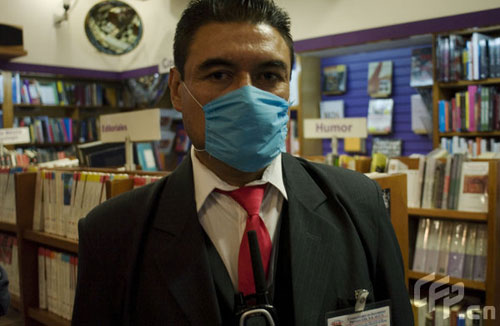Fears are on the rise that the swine flu outbreak could jeopardise the already fragile global economy and reverse its initial recovery.
 |
|
Swine Flu Outbreak in Mexico City.An outbreak of a rare type of the swine flue which is known to have killed about 20 persons and probably 40 more according department of health in Mexico, and is investigating 943 cases of people who might be infected with the virus. The Work Health Organization is already looking into the virus and monitoring the situation in Mexico as well as the United States where about 8 cases of the same swine virus. The WHO has also diverted funds and personnel to deal with the outbreak in the Mexican capital that has 20 million people. [CFP] |
Mexico, which is at the epicenter of the deadly disease, has so far reported a total of 1,995 suspected cases and at least 149 suspected swine flu deaths. Its northern neighbor, the United States, reported 42 confirmed cases, including 28 at one New York City school.
Confirmed or suspected cases are also found in Canada, Scotland, New Zealand, Spain, France and Israel.
Tourism in North America is the first to feel the chill as people chose to stay at home and governments advise their citizens to avoid non-vital travels to the region.
Many airlines issued polices waiving usual penalties for changing reservations for anyone traveling to, from, or through Mexico, and travel agencies across Asia and Europe have cancelled tours to the country.
TUI Travel, Europe's biggest tour operator, said it was suspending all trips to Mexico City through May 4, and Japan's largest tour agency JTB Corp. has suspended Mexico tours until June 30.
The U.S. government advised its people against most travels to Mexico and stepped up border checks. EU Health Commissioner Androulla Vassiliou also instructed Europeans to avoid nonessential travels to both Mexico and parts of the United States.
Britain, France and Germany have also issued similar notices strongly recommending their citizens not to travel to Mexico.
Major epidemic outbreaks usually mean dwindling business opportunities and reluctant trade. In 2008, a flu pandemic cost 3 trillion U.S. dollars and result in a nearly 5-percent drop in world gross domestic product, according to the World Bank data.
Such a scenario has been more unbearable as the world's countries struggle to reboot their economies. Analysts warned that measures to contain the epidemic could eat up gains in economic recovery.
The World Health Organization (WHO) on Monday raised its pandemic alert level from Phase 3 to Phase 4, which means the swine flu virus can cause sustained human-to-human transmission and "community-level outbreaks."
Observers said the swine flu could have a multifaceted impact on the global economy, and pinches could be felt for not only in tourism, transportation, but food and other supporting industries.
Brain Bethune, economist at IHS Global Insight, said, "You can argue that the swine flu amplifies the downside risks to the economy," reversing his remarks earlier this month that the world economy had "gone through the most terrible part of the recession."
Fears had weighed on shares of airlines and cruise lines and dragged down major indexes after U.S. health officials announced up to 40 cases of swine flu in five U.S. states.
Oil prices also opened sharply lower in the morning as investors worried that swine flu would further drag down the global economy. Crude futures in the New York market dropped to as low as 48.01 U.S. dollars a barrel in the intraday session.
Meanwhile, fears of a rampant outbreak of the fatal virus sent investors flocking to the U.S. dollar for safe haven.
By the end of the regular trading time on the COMEX Division of the New York Mercantile Exchange, dollar rate against euro has soared more than 2 cents to 1.3021 dollars and the dollar index rose about 1 point.
The only beneficiaries were drug-makers. Humana Inc., the second-biggest provider of U.S.-backed medical benefits, jumped after profit more than doubled.
CVS Caremark Corp. and Walgreen Co. advanced on speculation that the spread of swine flu will boost sales of pharmaceuticals.
In an effort to ease the panic, U.S. President Barack Obama said the threat of the swine flu infections was cause for concern but "not a cause for alarm."
His administration said it was too soon to determine the potential economic impact and officials with the U.S. Treasury Department were monitoring the situation.
(Xinhua News Agency April 28, 2009)